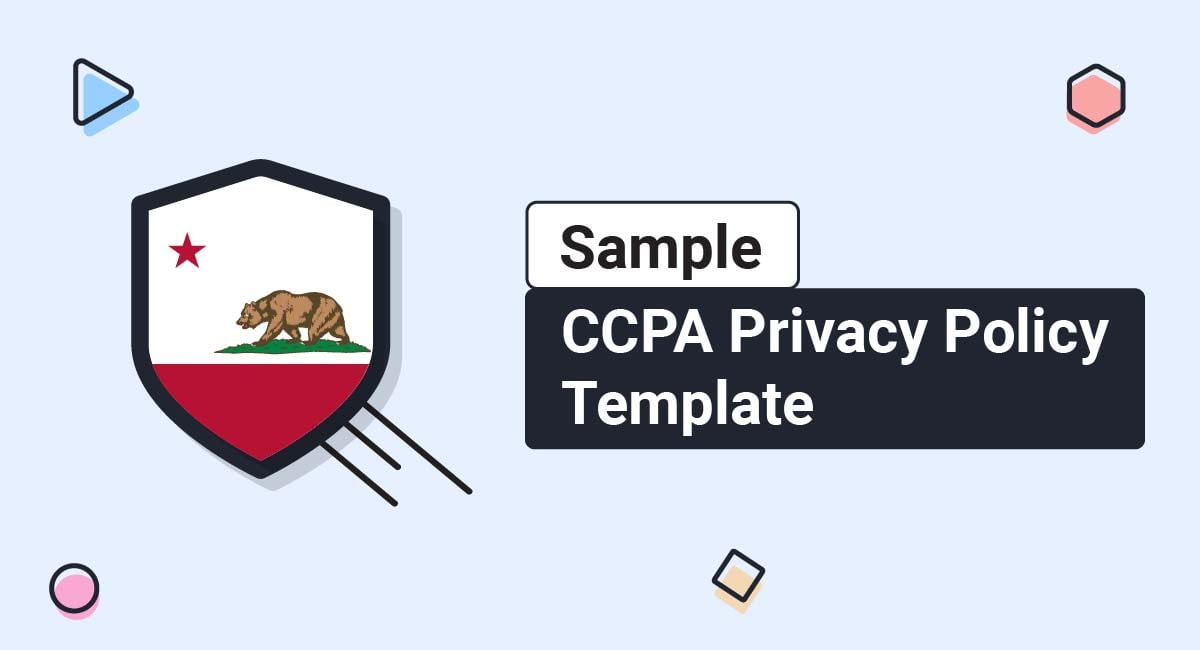

The California Consumer Privacy Act (CCPA) took effect on January 1st, 2020 and affects businesses all over the world. The CPRA expanded it via a number of expandions and amendments.
This law requires businesses to fully disclose how they treat consumers' personal information.
On your road towards CCPA (CPRA) compliance, one important job is to update your Privacy Policy to reflect the CCPA/CPRA's strict new transparency requirements.
In this article, we're going to walk you through how to create a CCPA (CPRA) Privacy Policy and examine how the CCPA/CPRA's Privacy Policy requirements differ from those of other privacy laws.
We've also put together a Sample CCPA (CPRA) Privacy Policy Template that you can use to help write your own.
Our Privacy Policy Generator makes it easy to create a Privacy Policy for your business. Just follow these steps:



 You'll be able to instantly access and download your new Privacy Policy.
You'll be able to instantly access and download your new Privacy Policy.The CCPA (CPRA) takes the United States closer to the sort of strict privacy regime that has existed for many years in the EU. It's clearly influenced by the EU's General Data Protection Regulation (GDPR).
But even GDPR-compliant businesses will have a lot of work to do to comply with the CCPA (CPRA).

The CCPA (CPRA) applies to "businesses." However, the CCPA (CPRA) defines "business" very narrowly.
A business is any for-profit entity doing business in California, that either:
A business also "determines the purposes and means of the processing of personal information." If you're familiar with the GDPR, you'll know that this is the definition of a "data controller."
Most companies fit this description. If your business collects personal information directly from its users, it probably fulfills this criteria.

The CCPA (CPRA) isn't only aimed at businesses based in California. It's aimed at any business that processes the personal information of consumers in California. So, much like another major California privacy law, the California Online Privacy Protection Act (CalOPPA), the CCPA (CPRA) applies to businesses all over the world.
Your business could be based anywhere from Fresno to France. As long as your services are accessible in California, you could be covered by the CCPA (CPRA) and have to adhere to its requirements.
Failing to maintain a CCPA/CPRA-compliant Privacy Policy could result in a fine of up to $7,500 per violation.
One of California's other privacy laws, CalOPPA, is enforced under the same rules as the CCPA. Delta Airlines narrowly escaped potential fine of over $37 million under CalOPPA for failing to add a Privacy Policy to its mobile app. This was due to the large number of customers who had downloaded the Delta Airlines app.
It's easy to see how these fines, even if small on their own, can really add up.

Your CCPA (CPRA) Privacy Policy has a number of requirements, from what clauses and information it must include, to how you display it and how often you update it.
We're going to take a detailed look at each of these requirements and some examples of businesses that are already complying by having a CCPA (CPRA) Privacy Policy. There are a couple of important things to note before we do this:
Most here's how The Guardian does this:
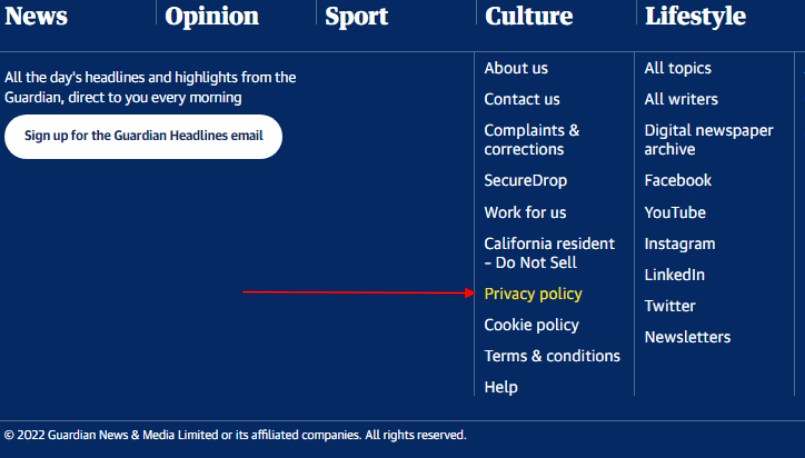
Here's a run-down of the information you need to provide in your Privacy Policy for CCPA (CPRA) compliance.

The CCPA (CPRA) contains a set of consumer rights. Your Privacy Policy must inform your consumers of their rights.
Consumers have the right to request access to personal information. They can make this request for free, twice per year.
Here are some of the other CCPA (CPRA) rights.
On receiving an access request, you must provide the necessary information in a portable and easily accessible format, normally within 45 days of the request.
When providing information under the right of access, you must include:
If the business sells personal information, the consumer also has a right to request access to the following information:
The consumer has a right to request the deletion of personal information that the business holds on the consumer.
However, this right does not apply where the business needs to retain the personal information in order to do any of the following:
The consumer has the right not to be discriminated against for having exercised their rights under the CCPA (CPRA). In particular, the business may not:
You need to let consumers know about all of these rights.
Here's how CBD Medic informs consumers about their right of access:
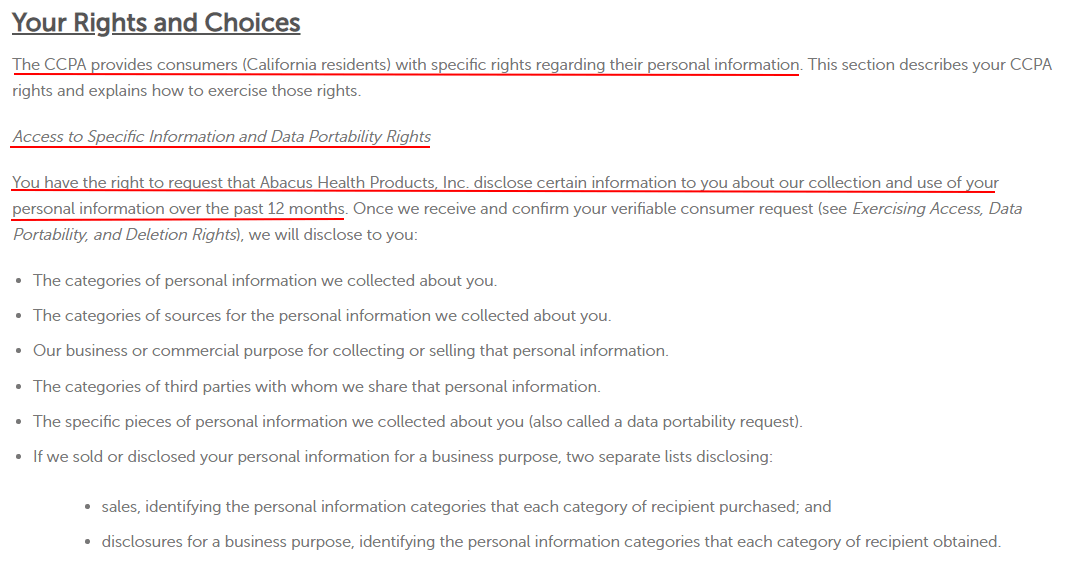
And here's how Runza informs consumers about their right to non-discrimination:

You can have a clause for each right that helps your customers understand what their rights are and how you're going to facilitate them.
It's not enough to simply tell consumers about their rights. You need to set up a system to help consumers exercise their rights. This must often include a toll-free number and web-page.
Your Privacy Policy must tell consumers how to submit a request to exercise their CCPA (CPRA) rights.
Here's how Techbuyer approaches this:
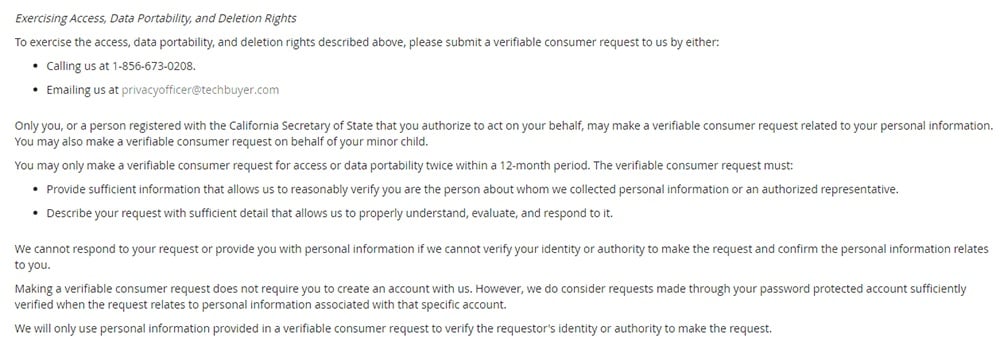
Note how the clause begins with a phone number and email address that customers can use to exercise the rights. Then, further details and important information is included such as what the customer must do, and any limitations for the requests.
The CCPA (CPRA) has notice requirements that you'll need to become familiar with as well, which we address in detail in our article: CCPA (CPRA) Notices. These notices include 4 consumer-specific notices.

The CCPA (CPRA) requires any business that sells consumers' personal information to provide a web page where consumers can opt out of having their personal information sold. This is known as a "Do Not Sell My Personal Information" page. The business must link to this page both on the front page of its website and in its Privacy Policy.
Here's how FloraFlex displays the link to its "Do Not Sell My Personal Information" page in its Privacy Policy:

While FloraFlex is obviously keen to demonstrate compliance with the CCPA, it's worth noting that only businesses that do sell personal information are required to comply with this part of the CCPA (CPRA).
You must provide a list of the categories of personal information you've collected over the past 12 months.
To comply with this requirement, you need to know what constitutes "personal information" under the CCPA (CPRA). Here's the definition as it appears in the CCPA (CPRA):
"information that identifies, relates to, describes, is capable of being associated with, or could reasonably be linked, directly or indirectly, with a particular consumer or household."
The CCPA (CPRA) lists the following categories of personal information:
Here's how Vertafore Solutions approaches this:
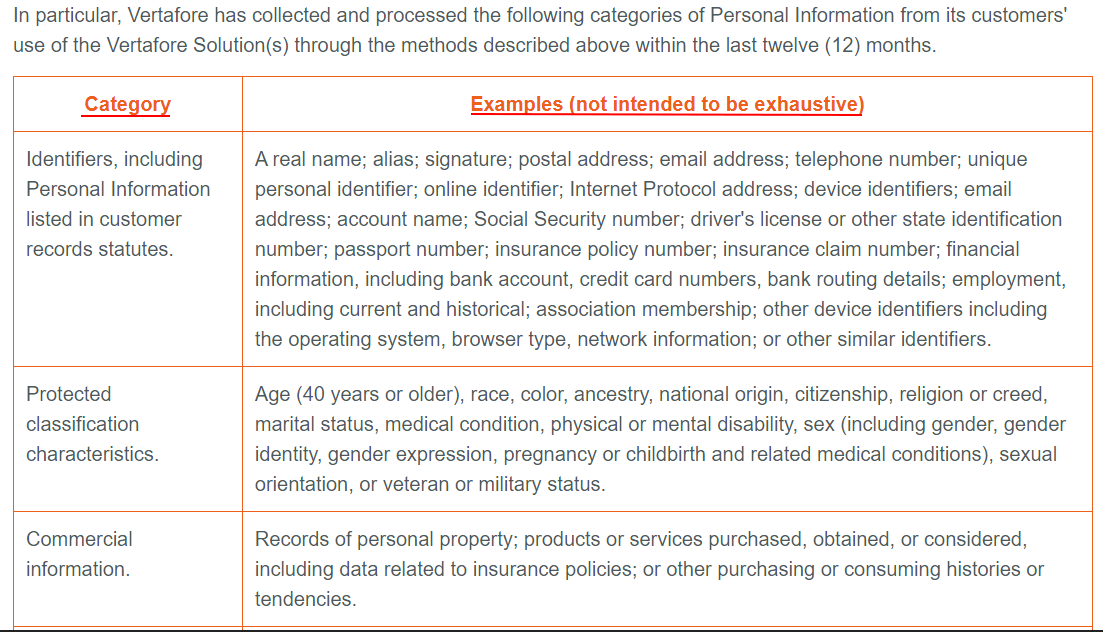
You don't have to use a chart format, but it's something to consider since it helps keep things organized and makes information easier for your users to sort through.
In addition to telling your users what categories of personal information you collect, you need to disclose your sources of personal information.
You may collect personal information from a variety of sources, depending on the context in which your business operates. You only need to list the categories of sources, i.e. the types of companies or other sources.
Here's an example from Brown-Forman:

Some of the sources listed include publicly-available database data, social network information and from marketing partners.
The CCPA (CPRA) requires that you tell consumers why you collect personal information - your purposes for collecting it. What are you actually doing with their personal information?
Here's how Brown-Forman does this in a very well-organized manner. It lists out all the uses of the personal information in a simple way, then links each list item to a more detailed section in the Privacy Policy where users can find out more information if they want to:
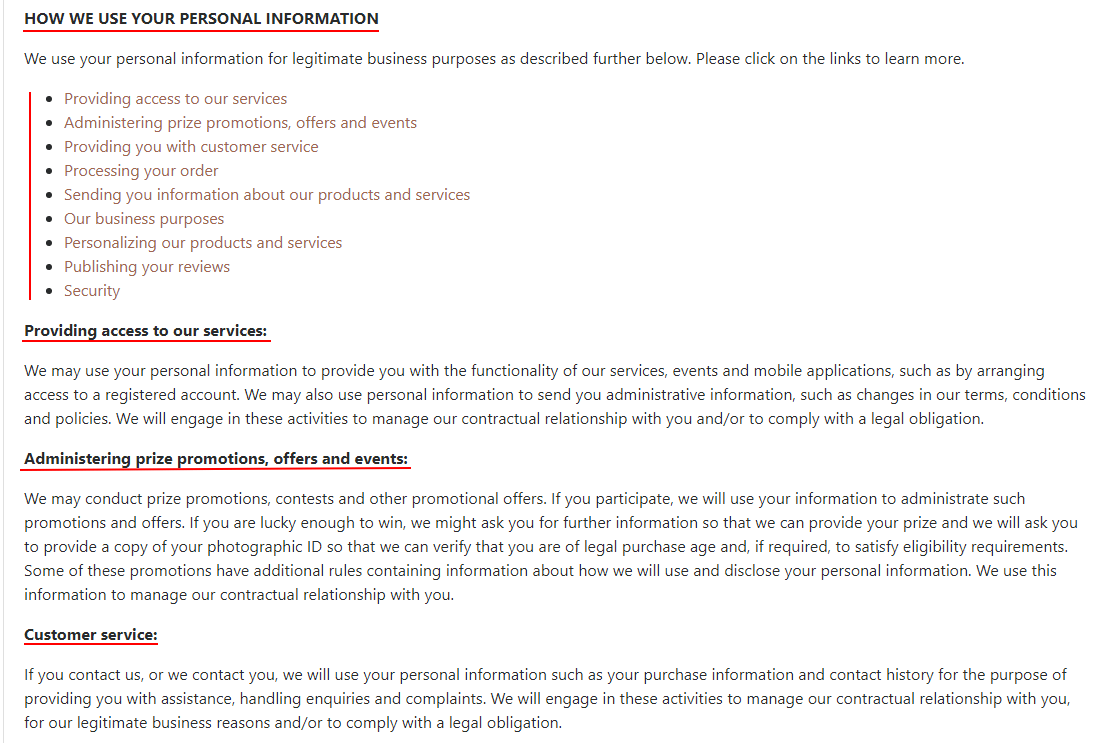
This type of clause is very standard across the board for Privacy Policies, so it's highly likely that yours already has this type of clause included, regardless of the way it's formatted.

Your Privacy Policy must list all the categories of personal data your business has sold in the past 12 months. If it hasn't sold any personal information over this period then it must disclose this.
Here's an example of how to do this:
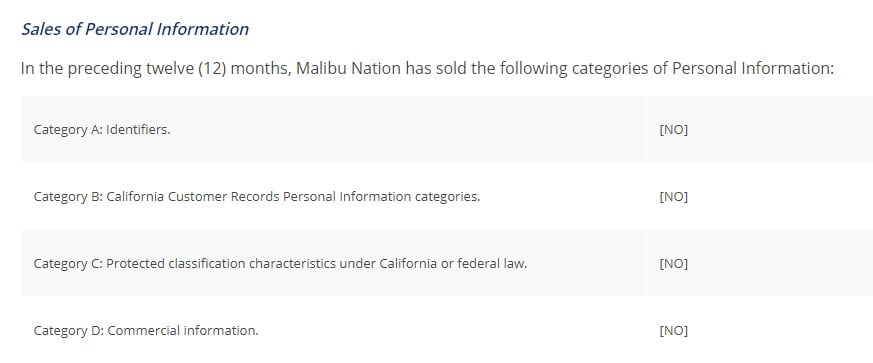
Note that the company has not sold any personal information in the past 12 months, so it lists "No" for each of the CCPA's categories of personal information. You can also make a simple blanket declaration that you have not sold any personal information in the past 12 months.
Your Privacy Policy must list all the categories of personal information your business has "disclosed for business purposes" over the past 12 months. If you haven't disclosed any personal information for business purposes over this period then you still must disclose this.
The CCPA (CPRA) gives categories of activities that count as "business purposes." If you share consumers' personal information with a third party so that they can perform these sorts of activities for you, you must disclose this in your Privacy Policy.
Note that these examples are not exhaustive.
Here's how marketing company Lumen5 discloses how it shares its users' personal information with service providers:

A CCPA/CPRA-compliant Privacy Policy needs to go further than this by listing the categories of personal information disclosed for each business purpose.

Here's how the CCPA/CPRA's Privacy Policy requirements match up against two other major privacy laws - the GDPR (EU) and CalOPPA (California).
| CCPA (CPRA) | GDPR | CalOPPA |
| Information about California consumers' CCPA (CPRA) consumer rights. | Information about your EU users' GDPR data subject rights. | N/A |
| Instructions on how California consumers can request access to and deletion of their personal information. | Instructions on how your EU users can exercise their rights over their personal information. | Instructions on how California consumers can request access to and deletion of their personal information (if you allow this). |
| A link to your "Do Not Sell My Personal Information" page. | Instructions on how your EU users can opt out of direct marketing or withdraw consent to the processing of their personal information. | Instructions on how consumers can opt out of third-party cookies (if you use them). |
| A list of the categories of personal information you've collected over the past 12 months. | A list of the categories of personal information you process. | A list of the categories of personal information you collect. |
| Your sources of each category of personal information you collect. | The ways in which you process personal information (this would include information about where you collect it from). | N/A |
| Your purposes for collecting each category of personal information. | Your purposes for processing each category of personal information. | N/A |
| A list of all the categories of personal information you've sold over the past 12 months. | N/A | N/A |
| A list of all the categories of personal information you've disclosed for business purposes over the past 12 months. | N/A | N/A |
| N/A | Your company's name and contact details. | N/A |
| N/A | Names and contact details of key personnel (Data Protection Officer, EU Representative). | N/A |
| N/A | A list of the categories of organizations with whom you share personal information. | A list of the categories of organizations with whom you share personal information. |
| N/A | Your lawful basis for processing each category of personal information. | N/A |
| How long you plan to retain data | The periods for which you store each category of personal information. | N/A |
| N/A | Information about any international transfers of personal information outside the EU. | N/A |
| N/A | N/A | The date on which the Privacy Policy takes effect. |
| N/A | N/A | Information about how you will inform consumers of any changes to the Privacy Policy. |
| N/A | N/A | Information about how your website responds to Do Not Track signals from visitors' web browsers. |
| N/A | N/A | Information about your use of third-party cookies or other tracking technologies (if you use them). |
For more information about how these laws compare, see:
For more information, also see our video on this: